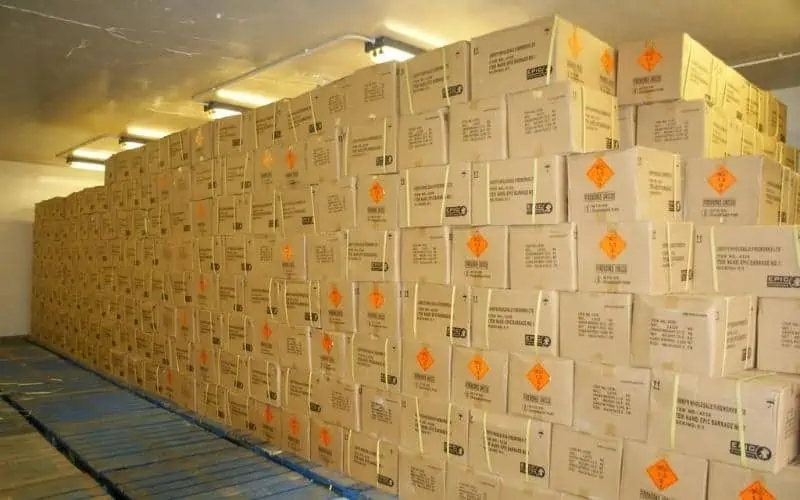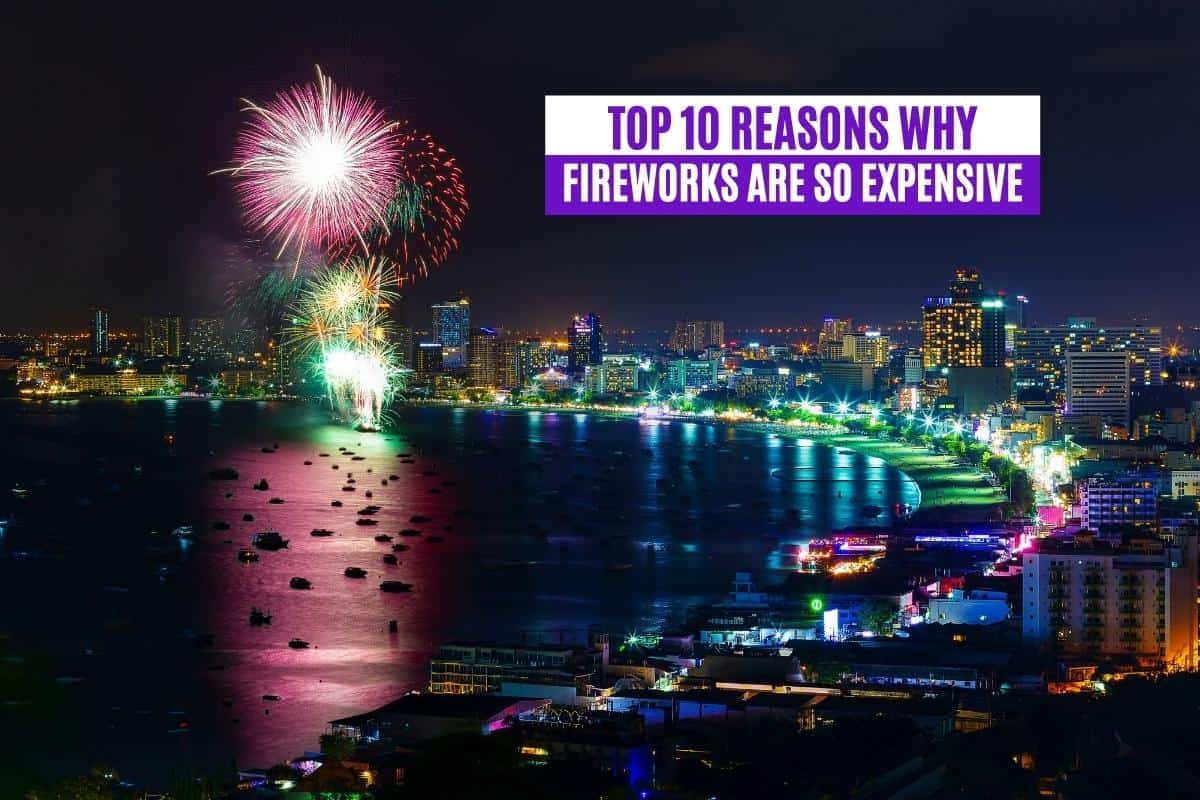In some shape or form, fireworks have been around for nearly 4,000 years! As you might expect from an ancient invention, the materials needed and the method of assembling fireworks are quite simple.
Which begs the question:
Why are fireworks so expensive?
And how can you save money when buying fireworks? (skip to the end for those tips!)
Here Are the Top 10 Reasons Why Fireworks Are So Expensive:

- All fireworks are handmade
- Most fireworks come from one distributor
- The permits needed to manufacture fireworks are expensive
- Production has decreased since the pandemic
- Shipping companies prefer not to handle them
- Stores selling fireworks need extra insurance
- Most fireworks are imported
- A large area of land is needed to manufacture fireworks
- Fireworks are expensive to store
- Licensing and training costs to handle Dangerous Goods are high
10. Licensing and Training Costs to Handle Dangerous Goods are High
Handling fireworks is tricky business. Insurance policies the world over won’t let just anyone transport them. Throughout the entire distribution process, every single worker on the supply chain has to be trained and licensed to handle fireworks. That can cost hundreds of dollars per person.
So to cover their costs, all distributors involved in moving fireworks charge more to handle pyrotechnic cargo than usual. Which pushes up the price for the next person in the chain, and eventually for consumers.
9. Fireworks are Expensive to Store

Much like any other explosive, fireworks can’t be left lying around. Their storage requirements include a controlled temperature environment, which can be expensive to achieve in metal containers.
More than that, fireworks have to be kept completely dry. Water won’t set off a firework-like a spike in temperature would, but it will make it a dud. If at any point on their international freight journey a firework gets wet, the next buyer in the supply chain won’t want it. So distributors have to invest in, not just temperature-controlled, but also watertight containers.
And it’s not just the storage facilities in transit that are expensive.
At the end of the supply chain, your local firework seller will have to store them. That environment should also be temperature-controlled and watertight. On top of that, storing fireworks for sale requires a license. A license that costs money.
8. A Large Area of Land is Needed to Manufacture Fireworks
Accidents at firework factories happen far too often. And once one goes off, there’s no stopping the rest.
But there are safety regulations in place to combat these dangers.
Fireworks factories should be made up of many separate buildings, each with only a few workers in them, that are widely spaced from each other. Ideally, then, if an accident does happen, it’s confined to one building and doesn’t destroy the entire factory’s goods, or injure all its workers.
Factory owners can’t build these workshops close together, and they can’t build them up either. Therefore, the amount of land needed to ‘safely’ (a relative term) manufacture fireworks is hugely disproportionate to the size of the product.
These necessary land costs are all factored into companies’ prices, and knock back to consumers, making fireworks appear to cost much more than the sum of their parts.
7. Most Fireworks Are Imported
Fireworks were invented by the Chinese, and that is still where the majority come from: more than 90% of Independence Day fireworks in the US come from China.
And products that come from overseas come with an extra price tag: shipping. As will be expanded upon in the following reasons, shipping leads to a supply chain, full of businesses that each increase their prices as they pass the product on. And each company has to pay for its own insurance and licenses that are required to be involved in fireworks handling to begin with.
With all that being said, why haven’t American firework manufacturers taken over? Surely without all that expensive international red tape to cut through, they could make fireworks for cheaper?
Not a chance.
Why Can’t US Manufacturers Compete?
While a firework factory in America – and they do exist! – would require the same set-up as one in China; they can’t compete with China’s lower costs.
Most firework factories in China are staffed by rural women, who are earning a pittance compared to what an American worker would be paid. Even if an American factory broke labor laws and underpaid its workers, it couldn’t reach the wages factories in China could pay theirs.
On top of that, when there’s a firework accident in the US, the legal system responds. When a firework display accident took three lives in an American city in 1955, firework sales within the city were banned indefinitely.
In China, though, hundreds of people die every year assembling fireworks, many of whom are children, but the safety laws don’t seem to be changing.
Some firework companies in The States who create large-scale firework shows do make their own pyrotechnics, but the products that your average family can afford for a celebration will always be foreign-made.
6. Stores Selling Fireworks Need Extra Insurance
Fireworks are classed as Dangerous Goods. As they should be, considering they’re full of gunpowder.
What if one (which may trigger the rest) accidentally goes off inside a store? There would be physical damages to pay for, maybe even injuries. Would a business’ insurance pay out for that?
Only if their insurance covers selling fireworks. Just like adding the risky ‘winter sports cover’ to your travel insurance shoots up the price, for a store to add ‘firework cover’ to their insurance isn’t cheap.
To make up for it, the store has to not just make a profit margin on fireworks’ cost, but cover their expensive insurance add-on as well. All of that adds up to a more expensive firework for their customers.
5. Shipping Companies Prefer Not to Handle Them
Considering all the extra costs for training everyone who has to handle fireworks, it’s clear why shipping companies would rather not transport Dangerous Goods.
The transport costs for a cargo ship that doesn’t have any fireworks are considerably lower than one that does.
Nonetheless, fireworks are always needing to be manufactured and shipped, right?
Wrong.
Since the Suez Canal was blocked in 2021, the world’s supply chain faced an unprecedented backlog. And they’ve still not recovered.
Because of the backlog, shipping companies now have more options. There’s more cargo that needs transporting.
So while they used to take on firework containers when they had to fill up their capacity; now when they’re offered firework cargo, they’re saying no. There’s enough demand to transport products that don’t require expensive training. They can fill their ships with safer cargo.
Plus, the freight companies are now charging even more for general shipping in the first place!
And what does that mean for consumers?
If fewer fireworks are being shipped while the demand stays the same, prices will skyrocket. Some estimates put the price hike at 32% in 2021, and it hasn’t dropped much yet.
4. Production Has Decreased Since the Pandemic
It may have been more than two years since the world first started going into lockdown, but the business world is still feeling the effects.
Worldwide, there are staff shortages caused by ‘The Great Resignation’ that had over 4.5 million Americans leave their jobs in November 2021 alone. And it’s showing no signs of slowing down.
On top of that, as people return to work, COVID absences become a new problem. While it was certainly good for the economy that businesses opened up again, many are still short-staffed.
Fireworks have a lengthy supply chain. From manufacturing to overseas distribution to redistribution abroad, a shortage of staff in each sector has a dramatic impact.
If fewer people are making fireworks, fewer shipping staff are available, fewer dock workers, fewer truck drivers, etc., eventually fewer fireworks make it to our local stores.
And when there are fewer, they cost more.
3. The Permits Needed to Manufacture Fireworks Are Hard to Obtain
In 2008, a huge accident spanning 20 warehouses set off 15,000 cartons of fireworks in Southern China.
After the accident, Chinese authorities upped security requirements around fireworks. But it seems to be less about safety and more about control.
All fireworks now had to be shipped out of Shanghai, rather than various ports across the country. A new special permit was also required to do so.
At the time, only three permits were handed out. And just one of those businessmen was able to export from Shanghai to the US.
So essentially, since 2008, every China-to-US pyrotechnic transaction has had to go through one businessman. Which leads to the second-biggest issue:
2. Most Fireworks Come From One Distributor
Monopoly is only fun when you’re winning, and one company in China is doing just that.
According to the Washington Post, around 70% of fireworks that arrive in America come through one businessman. Mr. Ding, based in Shanghai, runs the fireworks company Huayang, and the shipping company Firstrans International.
That means one businessman is managing the majority of the manufacture and international distribution of the world’s fireworks.
To give you an idea of the scale of this operation, the Washington Post surveyed 6 giant cargo ships arriving from Shanghai to the US in May 2018. Of the 408 containers on board, holding 13 million pounds of fireworks, 407 were from companies connected to Mr. Ding.
When you have a monopoly on an industry, you can charge what you like because consumers have no other options. Manufacturers and distributors that have tried to establish themselves as competitors always fail.
So fireworks will cost whatever Huayang decides they cost, and we can’t do much about it.
1. All Fireworks Are Handmade
Even if fireworks were made locally, there were no shipping costs, no expensive licenses, storage, or insurance; they still wouldn’t be cheap.
As explained in reason eight, fireworks are manufactured one by one on large expanses of land. But inside these sparse, individual buildings, each with only a few staff, there aren’t even any machines running!
The cost of fireworks will always stay high because they’re handmade.
As you can imagine, assembling fireworks is dangerous. They’re essentially rockets filled with gunpowder, just on the small side.
Workers usually wear cotton when assembling fireworks, because even static from synthetic clothing can set them off. Can you imagine what a single spark from an automated assembly line could do? It would be carnage.
So the work is meticulously done by hand, and cannot be rushed. Hence, it costs a bomb.
How to Save Money on Fireworks
So why are fireworks so expensive? Once you add up the training, licenses, storage facilities, land costs, import fees, insurance increases, labor shortages in the supply chain, increased demand, permits, monopolizing, and the fact they’re handmade, it’s easy to see why!
With all these factors jacking up the prices, are we doomed to buy fewer and fewer fireworks? Stuck staring at a firework-less sky next fourth of July? Not quite!
There are a few tricks to getting the most bang for your buck when it comes to buying fireworks.
First of all, buy them individually. When a few different shells are packaged and sold as a set, there’s always been a slight price increase. If your heart is set on those exact makes, hunt for them separately.
Second, tell your vendor how much you’re willing to spend. This may sound counter-intuitive to saving money. But if the seller knows your total budget, say $100, he might just offer you a deal for your bulk spending to make sure you come back to his shop next year.
A word of warning though!
Not all fireworks are legal in all states. So before you accidentally involve yourself in some shady deals, do a quick google search for ‘are fireworks legal in my state?’ to find out what you can and can’t buy.
Like this article? Check out the rest of our ‘Top 10 Expensive’ lifestyle blogs.
Or got an idea for a list you think we should write? Get in touch!

